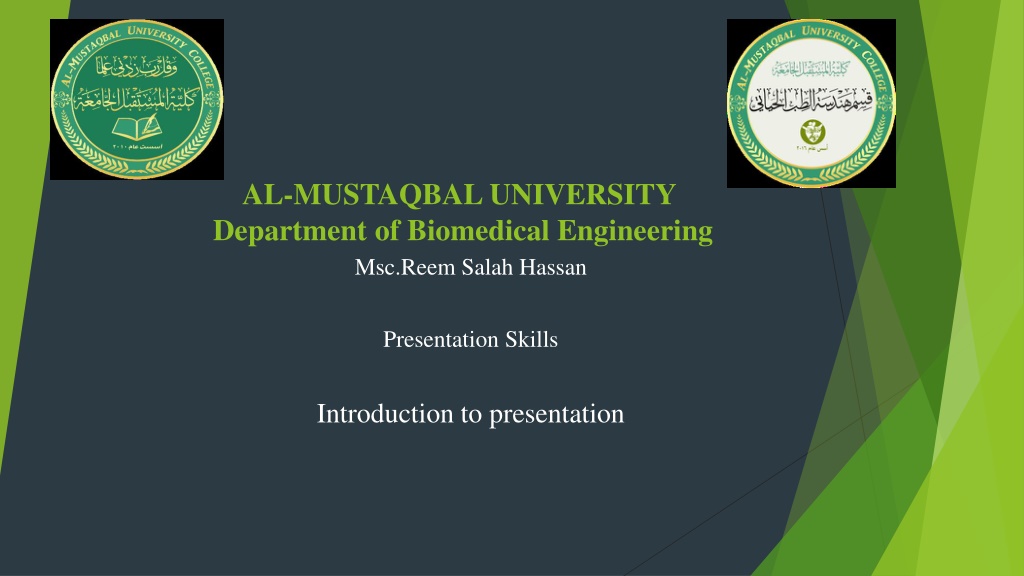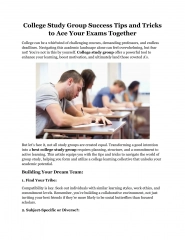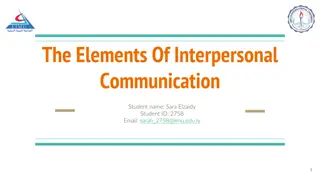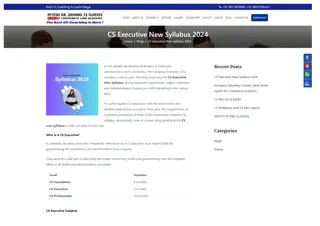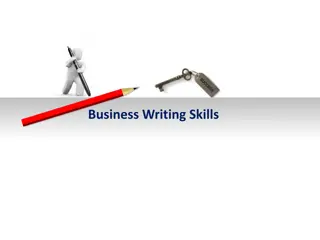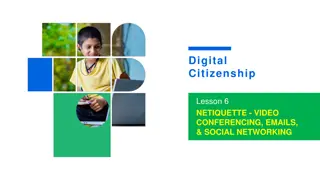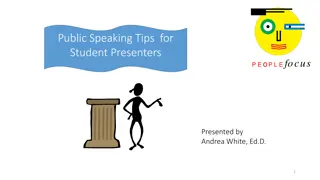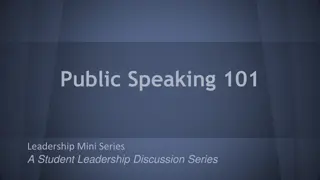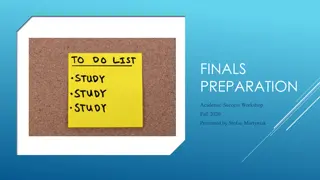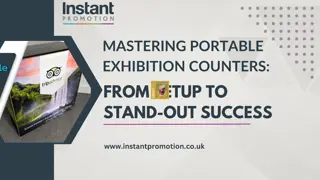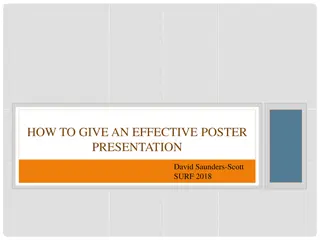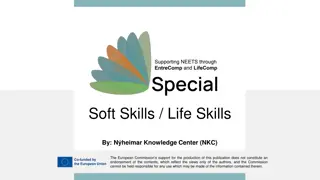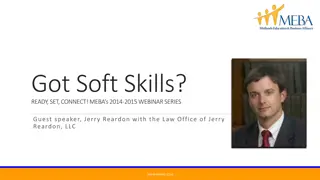Mastering Effective Presentation Skills: Tips for Success
Effective presentation skills are vital for keeping presentations engaging, boosting presenter confidence, and capturing the audience's attention. This guide discusses the importance of knowing your audience, mastering your content, practicing, and arriving early at the venue. By understanding these key elements, presenters can enhance their delivery and ensure a successful presentation. Embrace these tips to excel in your next presentation.
Download Presentation

Please find below an Image/Link to download the presentation.
The content on the website is provided AS IS for your information and personal use only. It may not be sold, licensed, or shared on other websites without obtaining consent from the author. Download presentation by click this link. If you encounter any issues during the download, it is possible that the publisher has removed the file from their server.
E N D
Presentation Transcript
AL-MUSTAQBAL UNIVERSITY Department of Biomedical Engineering Msc.Reem Salah Hassan Presentation Skills Introduction to presentation
The language of presentation, Problems and fears with Presentations, Qualities of an Effective Presenter Planning a Presentation Body language while presenting
Introduction Effective Presentation skills are important because they help keep a presentation interesting, help the presenter communicate with confidence, and motivate the audience to listen. Some essential presentation skills are: Creating variety. Speaking with optimal audibilit
Master Your Presentation Knowing the ins and outs of your presentation will help build your confidence. You should know what each slide on your presentation says, and you should also know what you're going to say about each slide. You don't want to read off of your slides. Instead, do your best to learn your presentation's subject matter by heart. Your Accompanying PowerPoint presentation is just a visual aid. Don't spend too much time fine-tuning your slide animations and transitions. Rather, focus on perfecting your message and making sure it's easy enough for your audience to understand
Practice, Practice, Practice As the popular saying goes, practice makes perfect. While you don't have to aim for 'perfect,' delivering a presentation that actually meets your goals should be at the top of your list. There's no definite number on how many times you should practice your presentation. But practicing once or twice probably won't suffice.
Know Your Audience Knowing who you're speaking to will help you deliver a presentation that will resonate with your audience. Find something that's common with your audience and mention that in your presentation. You may not know your audience on an individual level (this will be impossible if you're presenting to hundreds or thousands of people), but finding common ground is certainly possible.
Arrive Early At the Venue Coming to your presentation prepared is one of the best ways to ensure your presentation's success. You'll be able to survey the venue, double and triple check all equipment you're going to use and make sure everything's working perfectly. You can even try squeezing in one last practice, if possible.
Think Positively Thinking positively can go a long way in helping you overcome presentation fear. If you think your presentation's going to be a disaster, then it is going to be a disaster. However, if you think it's going to be a smashing success, then you're going to do your absolute best to make sure that happens. When you're optimistic, you tend to project your optimism while you're presenting.
Make Eye Contact No one wants to sit through a presentation where the presenter is fixated on his or her shoes, his computer screen, or anywhere else but the audience. The truth is most of us would think the presenter is being disrespectful. If you don't want your audience to think of you that way, then you should start working on making eye contact with the crowd.
Have a Sense of Humor Having a sense of humor is great. Learning how to put that to good use in your presentations is even better. No one wants to sit through a dry and boring presentation. Even if you're presenting a serious subject matter, saying a well- timed joke can help break the ice. What's even better is that when you know who your audience is, you'll be able to think of jokes that they'll find funny
Be Flexible Knowing your presentation's subject matter by heart is more important than writing a speech word-for-word. When you've got an entire speech laid out in front of you, you can easily fall into the trap of reading it out loud.
Be Confident When you're a nervous wreck on stage, your audience is not going to believe a word you say. In fact, they probably will tune you out shortly after you open your mouth. If you want your audience to give you the time of day, then you're going to have to work hard for it.
Don't Be Afraid To Pause Every Now And Then Don't you just love dramatic pauses? That moment of silence right before the presenter delivers a punchline? You can practically feel the anticipation building up inside you, and your thoughts turn towards guessing what the presenter is going to say
Engage With Your Audience Your audience is going to be spending their time listening to you. Make it worth their while. Respect them and address them as fellow human beings. Don't disrespect them by ignoring them and not engaging with them. When you engage with your audience, you not only gain their attention, but you also help ensure they understand your message perfectly.
Stop Making Excuses When you're already making excuses long before you've even given your presentation, then you're setting yourself up for failure. You're not giving yourself a chance to succeed. If you truly want to impress your audience, then you're going to give it all you've got. You're going to throw those excuses out the window. You're going to prepare for your presentation, you'll study the materials, you'll make an effort to know more about your audience, and you'll keep on practicing
Study Other Presenter Try your best to attend as many live presentations as possible. However, if you can't, there are plenty of recorded presentations on YouTube. Write down what you like and what you don't like. Study the presenters' body language, their speech, and their presentation slides. What's the crowd's reaction? Are they enjoying it? How do you feel? Do you think you can do it better? Knowing the answers to these questions will help you improve your presentation skills greatly
